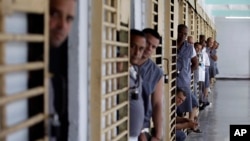The Cuban government says it will pardon and release more than 3,500 prisoners to mark Pope Francis' visit to the island this month - the largest amnesty since the 1959 revolution led by Fidel Castro that established communist rule in Cuba.
An announcement by the Council of State in Havana Friday did not indicate whether any of those being freed are considered political prisoners by Cuban and international human-rights organizations, but it did stipulate that there would be no early release for those charged with violations of state security - a label frequently applied to political prisoners.
The decree takes effect and the prisoners should be released within 72 hours, state-run media said. The 3,522 men and women being freed include those over 60 years old or younger than 20 with no previous criminal record, those chronically ill and inmates whose terms will end next year.
Those convicted of murder, child sexual abuse or violations of state security will not be released until completion of their sentences, the decree said.
This is the third time that Cuba freed prisoners to honor a papal visit, and the largest group since the revolution 56 years ago. Fidel Castro, who became president after he and his followers seized power, has since stepped down due to illness, and was replaced as president in 2006 by his brother, Raul.
Cuba previously pardoned to prisoners in December 2011, three months before a visit by former Pope Benedict XVI. Another pardon was issued in January 1998 following a visit to the island by the late Pope John Paul II, now a saint of the Roman Catholic Church.
In January of this year, as a gesture of improving relations with the United States, Cuba freed 53 inmates from a list of political prisoners kept by the U.S. government.





